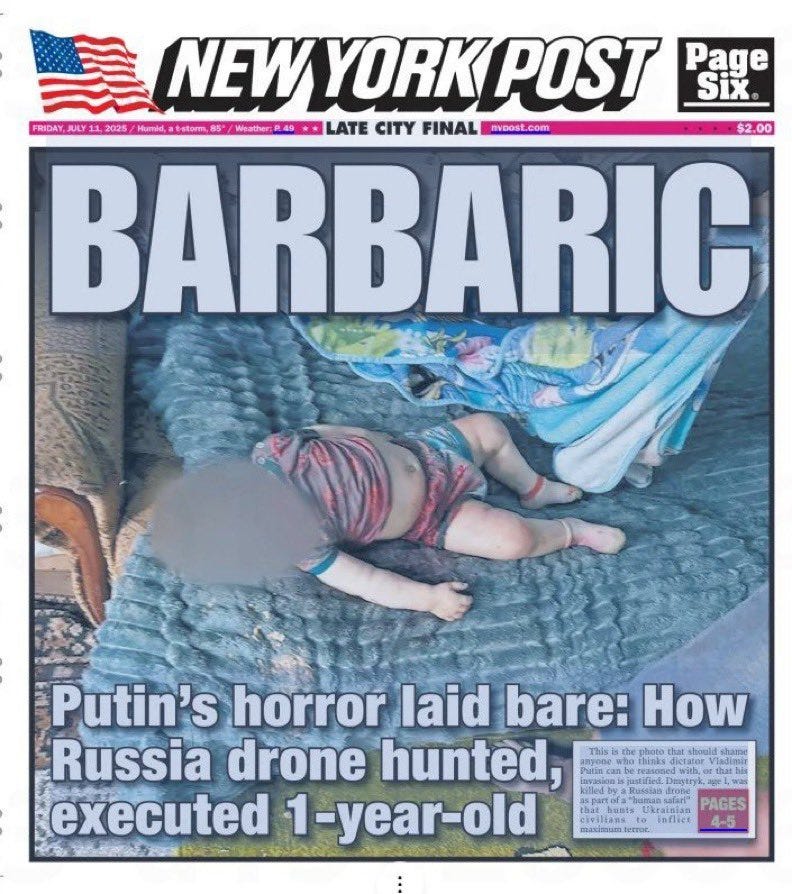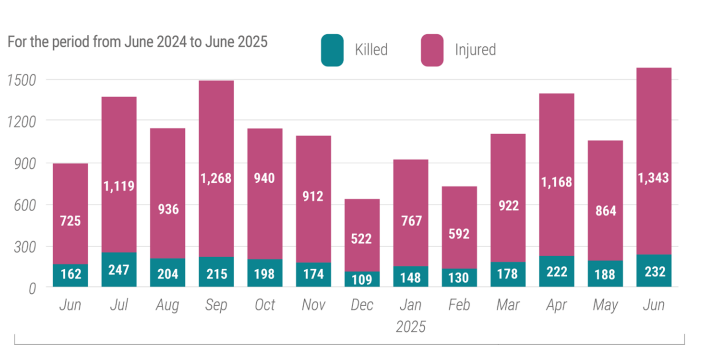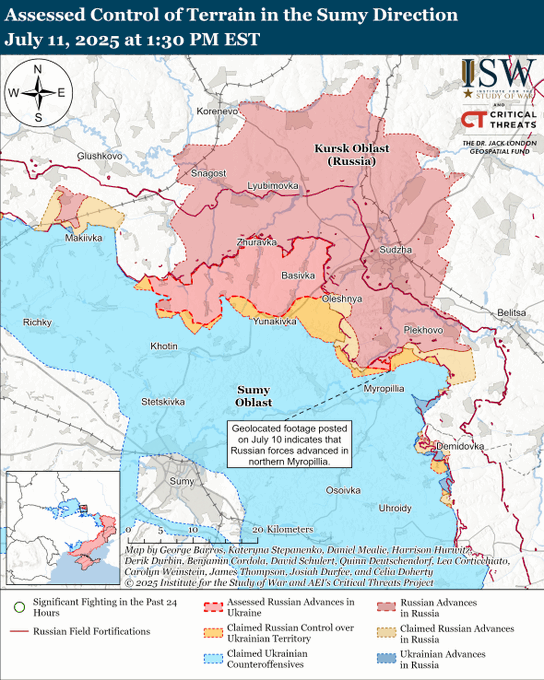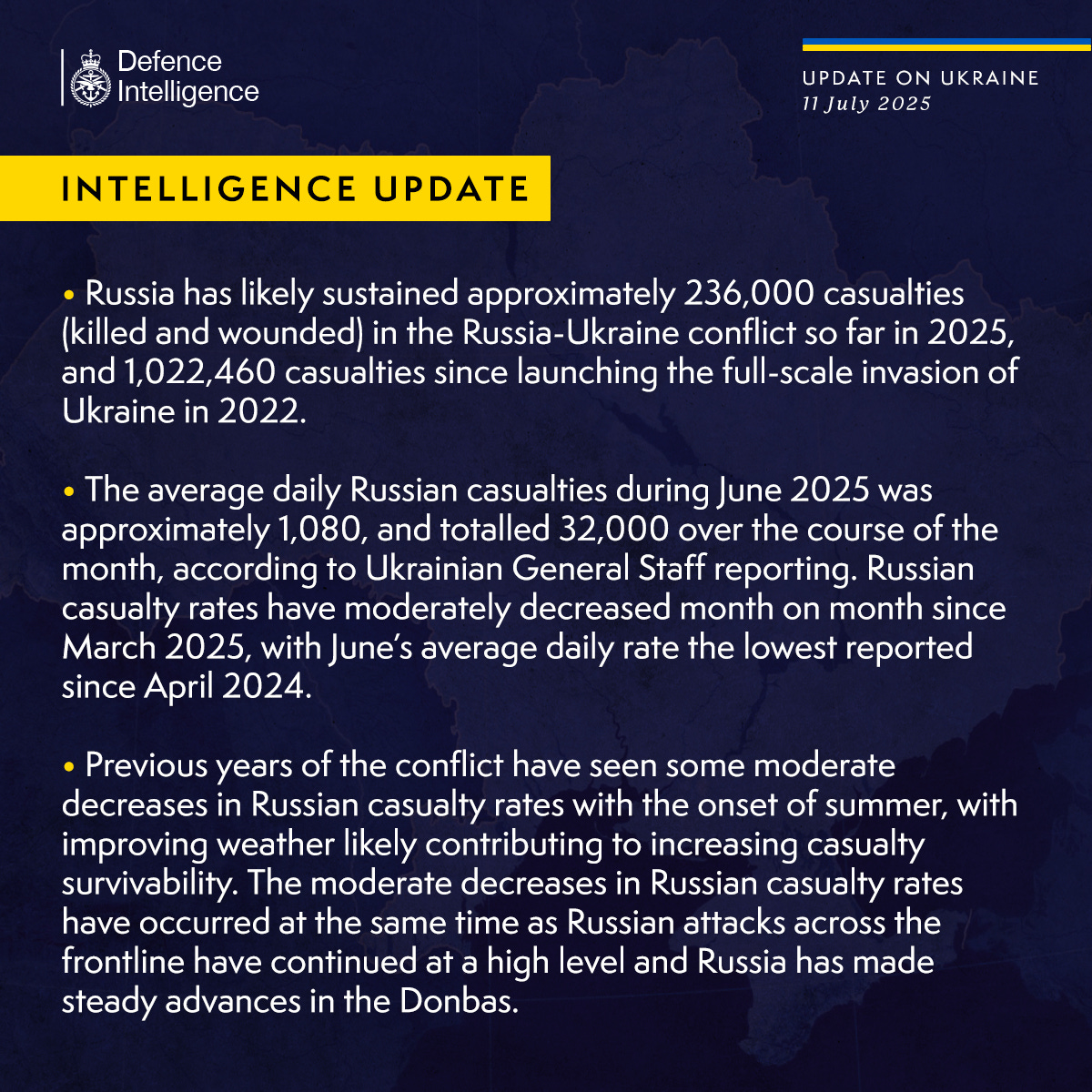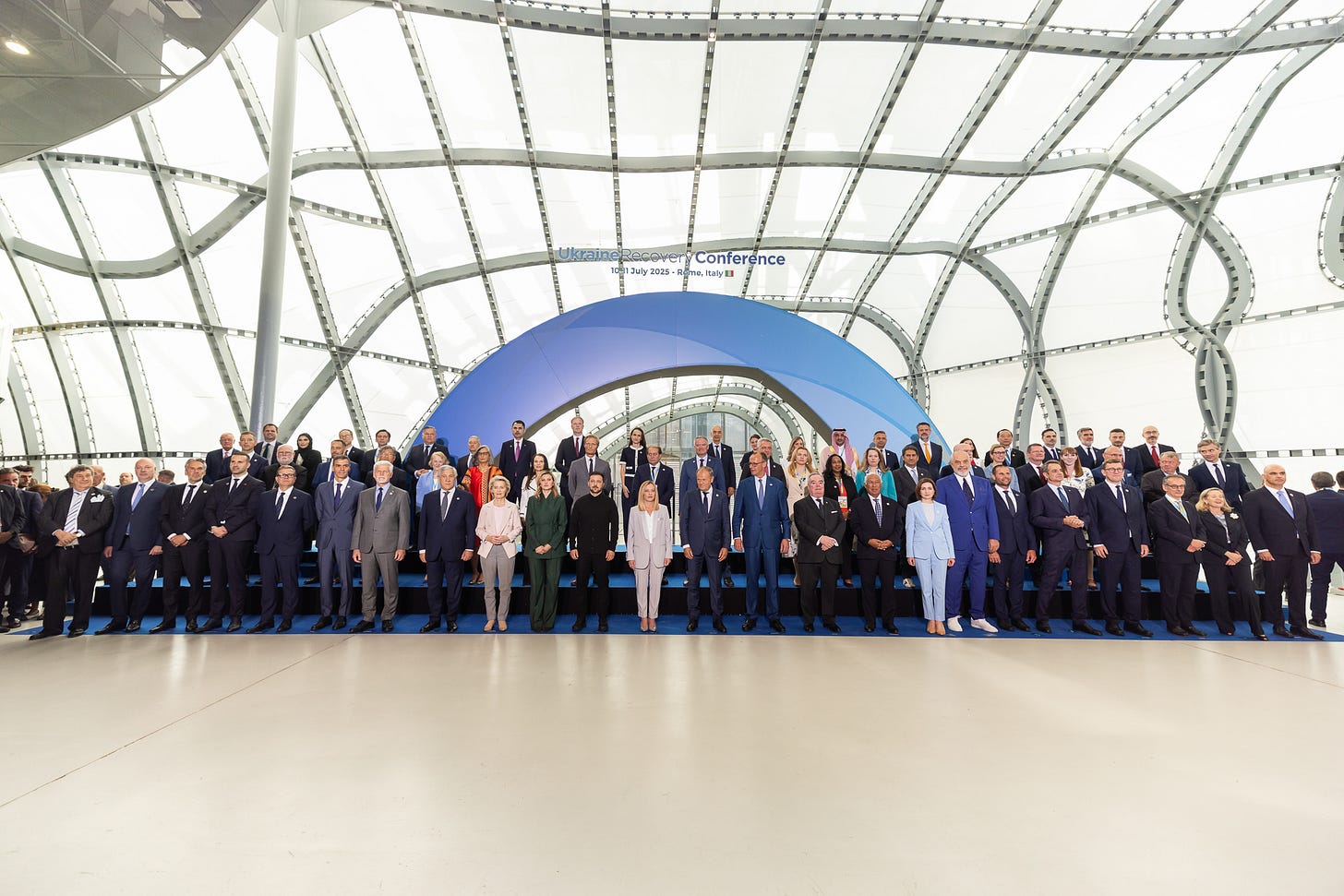Catching up…
For a general view of news from various geopolitical threatres, Scott’s EA Worldview is always superb.
Please note: E-Stories will be back in your inboxes around July 14 as I will be travelling. This post features a compilation of news stories spanning the past few days. What was particularly enjoyable was seeing the Russians get very angry over the resumption of US armaments deliveries to Ukraine.
Stories we’re following…
July 9: Russia is hitting Ukraine with everything they got. On July 9, Russia launched a massive aerial attack on Ukraine, using 741 air assault assets—728 Shahed-type drones and decoys, 7 Kh-101/Iskander-K cruise missiles, and 6 Kh-47M2 Kinzhal missiles. For the entire week, Russia rained some of the most intense missile and drone barrages on Ukraine since the beginning of the full-scale invasion.
Approximate map of Russian Shahed drone and missile routes during last night’s massive attack has been released, showing coordinated directions from Bryansk, Primorsko-Akhtarsk, Kursk, Orel, and Millerovo. Main target was the city of Lutsk in western Ukraine.
On July 10 the Russian missile and drone strikes did not abate: Ukraine was again subject to a massive missile and drone attack. Kyiv and Vasylkiv were targeted with Iskander-K cruise missiles, Iskander-M and KN-23 ballistic missiles, as well as Shahed-Geran and other drones. The number of injured in Kyiv following Russia’s massive overnight attack has risen to 16.
'Russia targets life' — Russian attacks kill 9, injure 42 over past day, damaging maternity hospital in Kharkiv. Regional authorities reported casualties in at least six Ukrainian oblasts over the past day.
Trump responded to Russia’s strike on a maternity hospital in Kharkiv, saying, “I know. You’ll be seeing things happening.”
Russian drone attack on Odesa injures 11, hits residential areas, horse stable. A Russian attack against the southern city of Odesa injured at least eight people and damaged residential areas, local authorities reported.
The Ukrainian child Dmytryk, 1 year old (the photo in the New York Post), was killed in Kherson by a Russian Fpv drone: this means that there was a Russian soldier guiding it, and had the child in his sights purposefully. A targeted assassination, a clear genocidal crime by Russia.
Ukraine deploying interceptor drones to defend Kyiv amid surge in Russian attacks. During several months of testing, the system intercepted nearly 550 Russian drones over Kyiv Oblast, an official said.
'Aid shipments have been restored,' Zelensky says amid halt of US weapons deliveries. "We have received political signals at the highest level — good signals — including from the United States and from our European friends. According to all reports, aid shipments have been restored," President Volodymyr Zelensky said.
July 12: Russia launched one of its most massive missile and drone attacks overnight, striking over ten regions across Ukraine.
In Lviv, multiple explosions destroyed homes, a kindergarten, a factory, and dozens of vehicles, with confirmed casualties.
Lutsk saw a house destroyed and fires triggered by the blast.
Kharkiv was hit at least ten times with guided bombs and drones, damaging key infrastructure.
Strikes were also reported in Kyiv region, Chernivtsi, Kirovohrad, Ternopil, Rivne, Cherkasy, Vinnytsia, Poltava, Sumy, and Odesa.
July 12: Russian strikes against Kharkiv continue.
July 11: Lviv suffered one of the largest drone attacks since the start of the Russian invasion last night. Residential buildings and cars were damaged, with many injured, including an 11-year-old boy.
Zelensky says Putin’s goal is to make Ukrainians suffer and flee through constant bombardment. The latest Russian strike used new, more painful drone modifications. “Putin has rejected peace proposals and is escalating,” he added, urging partners to boost air defense investments. A reminder that the reporting on the human safari in Kherson and other Ukrainian cities also cited the same goal, as was confirmed by the UN Special Council report which was released in June.
UN Report: In Ukraine, the UN said that June 2025 saw the highest monthly civilian casualties in three years, with 232 people killed and 1,343 injured. Putin is intensifying Russia's war against Ukraine.
Maria Avdeeva: “This is maternity hospital in Kharkiv. Russian drones didn’t hit the frontline — they hit homes, dental clinic, and this place with newborns. Mothers had to flee straight from their hospital beds. Russia’s war targets the very idea of life and future of Ukraine.”
Prior to the Ukrainian Recovery Conference on July 9, Pope Leo received president Zelensky. US Special Envoy to Ukraine, Keith Kellogg, also met with Zelensky.
Zelensky: “Grateful to Pope Leo XIV for the warm welcome at his private residence—the Papal Palace in Castel Gandolfo. It is a great honor to be here, in a place where European and world history was shaped over four centuries. This meeting, and the support for Ukraine and our people, is deeply meaningful.”
Combat Situation
Russia’s summer offensive in Ukraine is the bloodiest yet. Satellite data shows heavy strikes in Kherson, a major assault on Sumy, and brutal battles around Pokrovsk and Kostiantynivka. The Economist estimates suggest over 31,000 Russian soldiers have been killed since May 1.
Russian troops tasked to create 10-kilometer buffer zone in Dnipropetrovsk Oblast, Ukraine's spy chief says. According to Ukraine's military intelligence head Kyrylo Budanov, Russia’s earlier announcement of its entry into Dnipropetrovsk Oblast serves a political goal.
ISW: Ukrainian intelligence assesses that Russian forces are unlikely to realize the Kremlin's goal of seizing the entirety of Donetsk Oblast by the end of 2025, which is consistent with ISW's ongoing assessment of Russia's offensive capabilities.
Ukrainian forces advanced near Kupyansk, Lyman, and Novopavlivka. Russian forces advanced in northern Sumy and western Zaporizhia oblasts, and near Kupyansk, Lyman, and Toretsk.
In the past month alone, Ukraine’s Drone Systems Group hit over 19,600 targets and destroyed 5,024, including 88 Russian tanks, 129 armored vehicles, 427 artillery systems, and 31 MLRS units, according to Commander-in-Chief Syrskyi. Over 4,500 Russian troops were taken out of action, 2,548 of them killed.
This week, the Ukrainian forces carried out several strikes against Russian infrastructure and military targets:
In Penza, Russia, transformers were sabotaged at TPP-1, causing power outages across the city.
Several strikes against targets in the Kursk region.
the Voronin Aviation Plant in Lukhovitsy—part of the MiG Corporation under Russia’s state-owned UAC and Rostec. This strategic site produces and upgrades MiG-29, MiG-23, MiG-29K/KUB, and MiG-29M/M2 fighters.
the Tula Instrument Design Bureau, a key facility specializing in air defense missile systems. Ukrainian (Shahed-type) strike drones have been seen flying near the facility.
Fire and heavy smoke was reported at the Orsk Mechanical Plant in Russia.
Colonel Serhii Ilyin, commander of Russia’s 155th Naval Infantry Brigade, was eliminated on July 2.
On July 10, Ukrainian military intelligence confirmed the destruction of a Russian command post and five Russians in occupied Melitopol. The strike targeted a logistics hub set up by Russian forces at an industrial site used to house troops and military vehicles.
Ukraine has reportedly blown up a key Russian gas pipeline in Western Siberia, Bloomberg reports. Located in the Khanty-Mansi Autonomous Okrug, the pipeline had a capacity of 2.6 billion cubic meters per year and supplied gas to defense industry facilities in Chelyabinsk, Orenburg, and Sverdlovsk regions.
On July 10, the Trump administration resumed weapons shipments to Ukraine, including 155 mm shells and GMLRS. The halt reportedly caught even the White House off guard. Trump, asked who gave the order, said: “I don’t know. Why don’t you tell me?”
July 11: an An-124 “Ruslan” cargo aircraft was spotted flying over Kyiv. A rare sight in wartime skies, possibly en route to Poland. The resumption of US deliveries has been confirmed by president Zelensky in his evening address on July 11.
Czech arms manufacturer Excalibur Army announced on Tuesday the opening of a representative office in Ukraine, to which it will supply its products from 2025. The Czech company has modernized 100+ tanks for the Ukrainian army.
Ground drone maker Tencore raises $3.7 million in one of the largest known investments in Ukraine defense tech. The deal is one of the largest publicly disclosed investments in Ukrainian defense technology since Russia's full-scale invasion began in 2022.
Behind the Lines
The European Union hired a translator for highly classified meetings with Zelensky despite repeated preemptive warnings by Ukrainian diplomats of her ties to the Russian government. She was eventually fired for suspicion of spying for Russia.
Germany provides Ukraine with weapons to strike deep into Russia. The first long-range systems capable of hitting targets far behind Russian lines will arrive in Ukraine by the end of July, according to Bundeswehr General Christian Freuding. The head of the German Defense Ministry's support group for Kyiv is confident: the new deliveries will significantly boost Ukraine’s air defense and strike capabilities in the coming weeks.
The Times: “Trump Considering Global Oil Embargo Against Russia”
The U.S. President is seriously considering imposing strict sanctions on countries that continue oil trade with Russia — including China, India, and Turkey. This includes supporting a proposed bill that would introduce a 500% tariff on Russian oil imports — effectively amounting to a global oil embargo.
According to The Times, Trump’s shift in approach comes in response to Putin’s refusal to engage in peace talks and the continued Russian air and missile strikes on Ukrainian civilian targets. Previously, Trump had called the bill “too harsh,” but now says he is “carefully reviewing it.”
The key concern, the report notes, is the risk of economic consequences. Analysts say that even a partial implementation of these measures could inflict unprecedented and severe damage on the Russian economy.
July 11: Trump has struck a deal to supply US weapons to Ukraine with full NATO funding, CNN reports. “We’re sending weapons to NATO, and NATO pays 100 percent. We’ll send Patriot missiles to NATO, and they’ll distribute them,” Trump said. He also teased a “major announcement on Russia” this coming Monday.
U.S. House Speaker Mike Johnson on the US sanctions bill against Russia: “Putin has shown no willingness to be reasonable or to seriously discuss a peaceful resolution. I believe we need to send him a message—that’s my view.”
The Kremlin complained about Trump’s decision to resume arms deliveries to Ukraine, with Kremlin spokesperson Peskov claiming it “does not contribute to peace.”
Trump: “Putin showers us with bullshit. It sounds nice but means nothing. I’m very seriously considering sanctions against Russia. I’m not happy with Putin—he’s killing a lot of soldiers, his own and theirs. We’ve given the Ukrainians the best weapons ever made.”
The US Senate Armed Services Committee has approved the defense budget with $500 million in aid for Ukraine, up from $300 million in 2025. The NDAA also extends the Ukraine Security Assistance Initiative through 2028—passed with a strong 26–1 vote.
United24: Dutch Court Jails Former ASML Worker for Stealing and Sharing Trade Secrets with Russia.
An ex-employee of Dutch company ASML Holding NV has been sentenced to three years in prison by a Dutch court for sharing confidential information with Russia, violating sanctions laws, and stealing trade secrets, as was reported on July 11.
The 43-year-old man, who is of Russian nationality, worked for several companies in the semiconductor industry between 2015 and 2024, including ASML and NXP Semiconductors.
Bloomberg reports that he was found guilty of providing “technical assistance” by sharing files that included details about setting up production lines for microchips with a person in Russia, meant for use in Russian manufacturing.
ASML, based in Veldhoven, is a leading producer of machines used to manufacture microchips, which are integral components of devices ranging from laptops to military drones.
VSquare: Russians are hunting for the private data of thousands of people they consider Putin’s enemies. They use the data for doxing – exposing them to online attacks.
Ukraine’s Security Service has detained two Chinese spies attempting to steal classified technology related to the “Neptune” missile system. Den Yancheng tried to recruit a Ukrainian involved in the missile’s development to access technical documents, which he planned to pass to Chinese intelligence via his father. Both face up to 15 years in prison with asset confiscation.
Czechia will train eight Ukrainian F-16 pilots by the end of 2026. The program, run by LOM Praha, includes 150 hours of flight training and will be fully funded by the Czech government.
Ghana is ready to help fund the production of Ukrainian drones, President Zelensky said. In return, Ukraine is prepared to assist Ghana in strengthening border security—a new level of strategic partnership emerging.
On July 10, US Secretary of State Marco Rubio and Russian FM Lavrov started talks on the sidelines of the ASEAN forum in Malaysia, according to Russian media. The 50-minute meeting between Rubio and Lavrov in Kuala Lumpur ended without any public statements.
Rubio said his talk with Lavrov was “frank” and noted the US will engage with Russia “whenever possible.” He added Trump is disappointed by Moscow’s lack of flexibility on Ukraine and confirmed the administration is working with the Senate on new sanctions. The US also wants to see a clear roadmap to end the war.
Lavrov says he handed Rubio a list of quotes from Zelensky, Shmyhal, Yermak, and Podolyak calling to “destroy Russians”—legally or even physically.
Meanwhile in Russia & China…
Paul Goble: Kremlin Classifies Information Not Only about Demography but Also about Russian Foreign Policy.
Moscow’s decision not to publish demographic data has attracted enormous attention, but its almost simultaneous decision to do the same thing about foreign policy has not.
That is especially unfortunate given that much of the demographic data Rosstat will now stop publishing can be garnered, albeit with difficulty elsewhere, and because the classification of information on Russian foreign policy will allow Moscow to charge ever more people with breaking the law if they publish it.
On June 24, eight days before Rosstat’s decision was announced, Vladimir Putin signed a decree throwing the cloak of secrecy over all information about the tactics of Moscow’s foreign policy. It is sweeping in its scope and will likely soon become the basis for new charges against journalists and scholars.
Among the kind of information now declared secret are “reports about issues of foreign policy, foreign economic activity, foreign trade, scientific-technical links which reveal the strategy and tactics of the foreign policy of the Russian Federation,” a ban that can be used to suppress any discussion of mobilization for Putin’s war or his diplomatic activity generally.
Steve Roserberg for the BBC: One Russian paper today insists Donald Trump “hasn’t switched to Ukraine’s side. Trump is incapable of being on anyone’s side except his own.” It claims Trump’s “attempt to end the Ukraine conflict on his terms was a dismal failure. He looks like a loser.”
Sergey Lavrov paid a visit to his counterpart, Kim Jong-un on Friday. In essence, he went to request more North Korean cannon fodder: he thanked the North Koreans for their help in the war and stated that their further participation depends on Kim's decision.
Ukraine’s military intelligence chief Budanov told Bloomberg that North Korea now supplies up to 40% of Russia’s ammunition for the war. Pyongyang is also sending ballistic missiles and artillery systems. In return, Russia is providing funds and technology, helping North Korea bypass international isolation.
Russia respects North Korea's position on developing its nuclear program and treats it with understanding given the actions of Western countries around the DPRK, said Russian Foreign Minister Sergei Lavrov. The minister essentially accused the United States, South Korea and Japan of what he called a buildup of military potential around North Korea, Associated Press reports .
The Russian elite was horrified by the alleged suicide of the former transport minister and former Kursk governor Roman Starovoit, who was found shot dead. High-ranking officials and businessmen have become increasingly afraid for their positions and lives, and some of them have perceived the former transport minister's actions as a "demarche" towards the Kremlin. High-ranking government sources and former officials told Faridaily about this.
Prison sentences and other harsh measures in recent years have increased fear among Russia's elites, and the situation has begun to resemble the purges of the nomenklatura during the Stalinist repressions, said a source close to the government who worked in high positions for many years.
"Almost life sentences, the murder of [Wagner PMC founder Yevgeny] Prigozhin, Timur Ivanov (former deputy of Sergei Shoigu, who was sent to prison for 13 years - TMT)... make you think that if you end up in these millstones, you will be ground into dust." The death of Starovoit, who was personally known to many in the Russian power system, reinforced this confidence, the source admitted.
The symbol of Putin's regime and the "pride" of the Russian fleet is being scrapped. Russia's only aircraft carrier, Admiral Kuznetsov, may be sent for disposal. According to the pro-government outlet Izvestia, the Ministry of Defense and the shipbuilding industry are discussing whether it is worthwhile to continue its costly repair. The ship, built in 1985, has been under repair in Murmansk since 2018 with little progress. Modernization work has essentially been frozen. A decision about its fate should be made soon. If Kuznetsov is decommissioned, Russia will be left without any aircraft carriers.
Politico White House: This month, the U.S. Agency for International Development was folded into the State Department, a move Secretary of State Marco Rubio defended as bringing accountability to a bloated program that had failed its mission. China has stepped in where the US stepped out.
China has dramatically increased funding to the World Health Organization which at a time when the U.S. had been the leader on global public health, was very publicly and enthusiastically withdrawing from that leadership. That’s a significant move. China is conveying the message that, ‘We're a reliable partner.’ They're portraying a message of: ‘We're not going to leave you in the lurch.’
A historic event - a face-to-face meeting between the leaders of Azerbaijan and Armenia. Putin used to push the idea that “peace in this region is only possible through Russian mediation.” In fact, it turned out that peace came as soon as Putin's Russia left.
Hungarian PM Viktor Orbán declared, “Ukraine has lost the war—and so has Europe,” claiming no one has the courage to admit it. He insisted victory on the battlefield is impossible and called for a ceasefire and diplomacy.
Slovakia will back new EU sanctions against Russia if it secures an alternative to Russian gas, Politico reports. Prime Minister Robert Fico said he’s ready to support the 18th sanctions package—but only if a prior deal on energy supplies is reached. “We need to gain something from this struggle. We aim to settle the issue by July 15,” he added.
What is noticeable is that Italy is missing from the list of foreign ministers to sign the declaration. That being said, Georgians don’t need ‘deep concern’, which are just words. These countries have the capacity to sanction those political figures that are acting against international humanitarian law.
In Europe…
EU transfers $1.2 billion to Ukraine using profits from frozen Russian assets. Ukraine has received more than $18.5 billion from frozen Russian assets this year, directing the money toward swift recovery projects, Prime Minister Denys Shmyhal said.
The EU is preparing its toughest sanctions against Russia in the past three years, according to France’s Foreign Minister. The new measures will target Russia’s oil revenues, financial structures, and intermediaries in third countries. Jean-Noël Barrot noted that attacks on Ukraine have increased fivefold, saying Putin must agree to a ceasefire. Zelensky discussed the 18th sanctions package against Russia with António Costa and Ursula von der Leyen, stressing the need to increase pressure on Moscow. He thanked EU leaders for their support at the Ukraine Recovery Conference and a new €2 billion aid package.
Follow-up: EU ambassadors failed to approve the 18th sanctions package against Russia during a Coreper meeting due to continued obstruction by Slovakia, reports European Pravda. The ambassadors will revisit the proposal on Friday, July 11, with hopes of final approval by the EU Foreign Affairs Council on Tuesday, July 15.
Ukraine Recovery Conference also brought US and Ukrainian defence sector businesses together: Ukraine and the US will jointly produce gunpowder, according to Strategic Industries Minister Kamyshin. The deal, signed between Ukroboronprom and a US company, involves production on American soil. At least five defense industry agreements were signed during the Ukraine Recovery Conference in Rome—some remain classified.
Lithuania will provide over €20 million for education projects in Ukraine, Education Minister Oksen Lisovyi announced. €17 million will go toward building a modern school hub in Zhytomyr, designed as a safe, inclusive, and innovative space for children. Additional funds will support solar systems in schools across seven regions and STEAM recovery programs in Odesa.
General Keith Kellogg says international partners must step up and support Ukraine’s reconstruction by creating a modern-day Marshall Plan tailored for the country’s recovery after the war.
Speaking in Rome, he emphasized safe return of refugees, repatriation of kidnapped children, full veteran support, and nationwide demining. Long-term investments, he stressed, hinge on a lasting and comprehensive peace—not just a ceasefire.
President Zelensky on the Ukrainian Recovery Conference in Rome:
We are grateful to Italy for hosting the Ukraine Recovery Conference URC 2025. The level is high – more than 30 countries, hundreds of companies from around the world, political and civil society leaders. Over 200 various agreements totaling more than €10 billion. A new European support package – over €2 billion. A program from Finland – more than €300 million, specifically for recovery. A package from the Netherlands – €300 million. Germany has expressed its readiness to help procure an additional Patriot system.
It is important that the conference also highlighted the humanitarian aspect of our country’s recovery – particularly the human aspect: physical, social, and mental recovery.
We thank all the leaders and participants of the Conference for their attention to Ukraine, to the needs of our people, and to our shared responsibility to do everything possible to protect life. We continue working for genuine peace, security, and recovery. We are thankful to everyone who stands with Ukraine today.
French Defense Minister Sébastien Lecornu announced that production of SCALP-EG cruise missiles will restart in 2025, 15 years after the last order. The move comes amid recognition of the missile's effectiveness in Ukraine, where it’s being widely used against Russian forces. It is also significant for EU member state deterrance posture.
The UK has announced a major defense agreement with Ukraine, set to be signed at the URC conference. Under the £2.5 billion, 19-year deal, more than 5,000 Thales air defense missiles will be delivered to Kyiv. The UK also pledged £283 million in aid for 2025, plus funding for governance reform and green energy initiatives.
The Record: The Spanish government is using Huawei to manage and store judicially authorized wiretaps in the country used by both law enforcement and intelligence services, despite concerns about how the Chinese government could compel Huawei to assist Beijing with its own intelligence activities.
The Ministry of the Interior officially awarded Huawei a €12.3 million ($14.3 million) contract following a standard public procurement process, as first reported by Spanish digital newspaper The Objective. Huawei had already been contracted to provide technical support to SITEL (Sistema Integrado de Interceptación Legal de las Telecomunicaciones), Spain’s integrated system for intercepting telecommunications.
Militarnyi: Chinese Electric Cars in Israel Found to Be Transmitting Data to China. The Israeli Ministry of Defense has officially suspended the supply of Chinese electric vehicles from BYD to IDF officers due to concerns over data collection via embedded communication systems and sensors. Ynetnews reported on this. The ban came after numerous warnings from cybersecurity experts, who emphasized that Chinese vehicles could be used as tools for espionage.
Chancellor Merz confirmed at a Rome conference that Germany is prepared to purchase additional Patriot air defense systems from the US for delivery to Ukraine. Merz said he discussed the plan with President Trump last week
Politico: French prosecutors have opened a criminal investigation into X over allegations that the company owned by billionaire Elon Musk manipulated its algorithms for the purposes of “foreign interference.”
NYT: Valery Gergiev, an ally of Vladimir V. Putin, is set to conduct in Western Europe for the first time since institutions there cut ties over Russia’s invasion of Ukraine.
Mr. Gergiev, a staunch ally of Mr. Putin who has helped promote the president’s policies, is set to conduct on July 27 at the Royal Palace of Caserta, a historic site north of Naples, the Un’Estate da RE festival announced last week. He will lead an orchestra from Salerno, Italy, in a program featuring performers from the Mariinsky Theater in St. Petersburg, which Mr. Gergiev leads.
The announcement drew protests from Italian politicians and activists, who expressed concern that Mr. Gergiev was being allowed to perform again in the West. Mr. Gergiev, whose extensive international career once made him one of the busiest maestros in the world, has been declared unwelcome in the United States and Europe since the Russian invasion.
In other news…
An investigation into the Air India Dreamliner crash that killed 260 people last month showed that fuel switches flipped to cutoff mode seconds after takeoff. The report details the moments before the crash. Boeing settled with a Canadian man whose family died in the crash of an Ethiopian Airlines 737 MAX crash in 2019.
CNN: Trump announces tariffs of 30% on Mexico and the European Union. The EU and Mexico join a growing list of countries whose imports will face updated duties on August 1, since Trump began posting tariff letters on Monday with rates of up to 40%. In his letters to the EU and Mexico, Trump said that all imports were subject to the 30% tariff, excluding “Sectoral Tariffs,” such as the 25% auto tariff.
Trump arrived to survey the damage from the deadly floods as questions surfaced over whether officials could have done more to warn people of the danger. Homeland Security Secretary Kristi Noem called for FEMA to be eliminated in its current form even as it deploys specialists and supplies to the flood zone.
Dismissed U.S. State Department employees leave their workplaces to the sound of applause. Outside the building, people greeted them with signs reading “Thank you, American diplomats” and “We all deserve better.” On July 11, the State Department fired 1,107 civil service employees and 246 diplomats. Nearly all of them worked with refugees, including resettlement of Afghans. According to CBS News, total layoffs may reach nearly 3,000 people.






